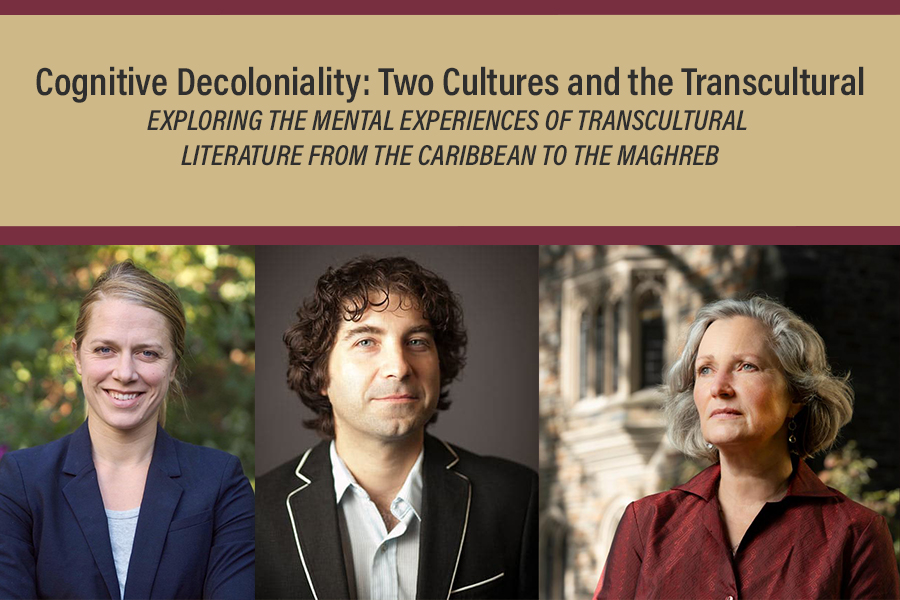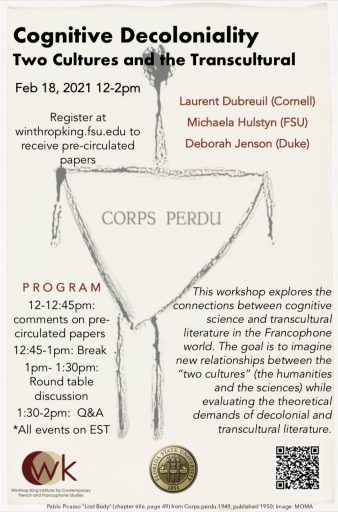
Florida State University’s Winthrop-King Institute for Contemporary French and Francophone Studies and the FSU Department of Modern Languages and Linguistics will explore the connections between cognitive science and transcultural literature in the Francophone world through a one-day virtual symposium.
“Cognitive Decoloniality: Two Cultures and the Transcultural, Exploring the Mental Experiences of Transcultural Literature from the Caribbean to the Maghreb” will take place Thursday, Feb. 18 via Zoom. The event examines texts from Francophone North Africa and the Caribbean with an eye toward decoloniality, literature and the mind. Decoloniality references the power created through the processes, experience and aftermath of colonialization and explores the connections and ways of living that were displaced by the impact of colonialism.
 “Bringing together the transcultural and the two cultures of the humanities and sciences means considering decolonial literatures through the lens of the cognitive while also considering the cognitive through the structure and struggle of decolonial thought,” said Michaela Hulstyn, symposium organizer and FSU assistant professor of French.
“Bringing together the transcultural and the two cultures of the humanities and sciences means considering decolonial literatures through the lens of the cognitive while also considering the cognitive through the structure and struggle of decolonial thought,” said Michaela Hulstyn, symposium organizer and FSU assistant professor of French.
“Each panelist is working on interdisciplinary approaches to philosophical questions such as the dialogue between the humanities and the sciences, the relationships between language and mind, the expression of bilingual consciousness, and the neural as a pathway to decoloniality.”
This symposium, through pre-circulated papers and a roundtable event, challenges participants to imagine new relationships between the cultures of the humanities and the sciences while simultaneously evaluating theoretical demands that decolonial and transcultural literature require.
“The event provides an opportunity to think with the works of important decolonial thinkers — Aimé Césaire, Sylvia Wynter, Abdelkebir Khatibi — in light of cognitive research on semantic mapping, the plasticity of alphabetic literacy and bilingual brains,” Hulstyn said.
Symposium keynote speakers include Deborah Jenson, professor of French, Romance Studies and Global Health at Duke University; Laurent Dubreuil, professor of French, Francophone and Comparative Literature at Cornell University; and FSU’s Hulstyn.
Cognitive Decoloniality is organized by FSU’s Winthrop-King Institute for Contemporary French and Francophone Studies and the FSU Department of Modern Languages and Linguistics, part of the College of Arts and Sciences.
Symposium events are free and open to the public, but registration is required. Visit the event website for full details, speaker biographies and links to register.
Events include:
Thursday, Feb. 18
12 p.m.
Preliminary comments on questions on pre-circulated papers
Deborah Jenson, Laurent Dubreuil and Michaela Hulstyn
1 p.m.
Roundtable discussion: The Two Cultures and the Transcultural
1:30 p.m.
Question-and-answer session




